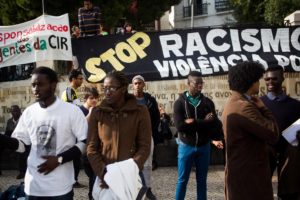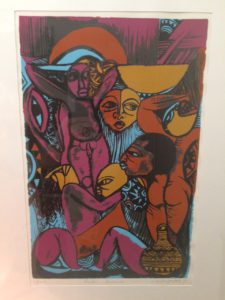21 March – International Day for the Elimination of Racial Discrimination
‘It’s violence of a racist nature perpetrated into our prison system.’
– José Pureza, MP of the Left Bloc (BE)
‘Accusations of racism, xenophobia, and torture are a shame for our country.’
– Carlos Peixoto, MP of the Social Democrats (PSD)
‘It’s a reality that exists, apartheid in our society.’
– Isabel Moreira, MP of the Socialist Party (PS)
‘Police violence is serious but look, violence against the police also increased.’
– Vânia da Silva, MP of the Christian Democrats (CDS)
 Both left and right wing parties in Parliament are concerned about racism in the police force and violation of human rights in prisons. The reason is a recently published report of the European Committee against Torture, stating that police violence in Portugal – in particular against African descendants – is the highest in Western Europe.
Both left and right wing parties in Parliament are concerned about racism in the police force and violation of human rights in prisons. The reason is a recently published report of the European Committee against Torture, stating that police violence in Portugal – in particular against African descendants – is the highest in Western Europe.
 The committee – that also visited the country in 2013 – emphasizes that the police violence at police stations has increased and that the situation in the overcrowded prisons of Caxias, Setubal, and Lisbon is ‘inhuman and degrading.’
The committee – that also visited the country in 2013 – emphasizes that the police violence at police stations has increased and that the situation in the overcrowded prisons of Caxias, Setubal, and Lisbon is ‘inhuman and degrading.’
 Julia Kozma, lawyer and chairing the European delegation, points the finger towards the Ministry of Internal Affairs – responsible for the police and the security forces – and regrets its lack of ‘awareness’. The Ministry denies the accusations and declares that ‘all complaints about violent police conduct are investigated by the Internal General Inspectorate (IGAI) and immediately reported to the Public Prosecutor.’
Julia Kozma, lawyer and chairing the European delegation, points the finger towards the Ministry of Internal Affairs – responsible for the police and the security forces – and regrets its lack of ‘awareness’. The Ministry denies the accusations and declares that ‘all complaints about violent police conduct are investigated by the Internal General Inspectorate (IGAI) and immediately reported to the Public Prosecutor.’
 The reality, however, is that only a very small number of the complaints are brought before court. ‘And that’s exactly the problem’, says Kozma. ‘There is a spirit of impunity and bureaucracy, whereby complaining doesn’t help. The inspection body (IGAI) needs more skills to conduct criminal investigations and more resources to act independently.’
The reality, however, is that only a very small number of the complaints are brought before court. ‘And that’s exactly the problem’, says Kozma. ‘There is a spirit of impunity and bureaucracy, whereby complaining doesn’t help. The inspection body (IGAI) needs more skills to conduct criminal investigations and more resources to act independently.’
Pedro Neto, the director of Amnesty International in Portugal, also believes that the IGAI – “the police of the police” – should become independent of the Ministry. ’One government department cannot control another state entity.’
 In recent months the non-governmental organization SOS racism received an increasing number of grievances from inmates in the prison of Lisbon about racist provocations and intimidations. Peculiar was that all complaints came from African immigrants and that any registration on xenophobe or racist behavior from the guards and staff is lacking.
In recent months the non-governmental organization SOS racism received an increasing number of grievances from inmates in the prison of Lisbon about racist provocations and intimidations. Peculiar was that all complaints came from African immigrants and that any registration on xenophobe or racist behavior from the guards and staff is lacking.
All hope is now pinned on the Minister of Justice, Francisca van Dunem. She announced recently not only to reduce the number of convicts in jail but also to improve the conditions in detention centers. Bias
Bom fim de semana Have a nice weekend [photo’s Público/Sapo]

 ‘These numbers are shocking’, says Alípio Ribeiro, an attorney from the Criminal Investigation Department and confirm what he already thought: ‘there is a legal system for whites and a legal system for blacks’.
‘These numbers are shocking’, says Alípio Ribeiro, an attorney from the Criminal Investigation Department and confirm what he already thought: ‘there is a legal system for whites and a legal system for blacks’. Celso Manata, head of DGPJ, however, rejects the idea that the legal system is discriminatory. He admits that there is an over-representation of blacks in Portuguese prisons, but believes that ‘this is caused by the poor socio-economic circumstances of black people, who therefore are more likely to commit a crime’.
Celso Manata, head of DGPJ, however, rejects the idea that the legal system is discriminatory. He admits that there is an over-representation of blacks in Portuguese prisons, but believes that ‘this is caused by the poor socio-economic circumstances of black people, who therefore are more likely to commit a crime’.